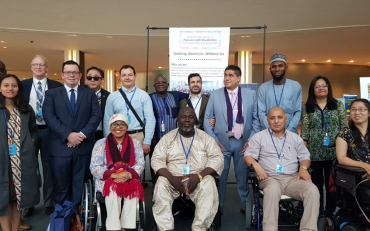1. Summary of HLPF 2019
-
The Stakeholder Group of Persons with Disabilities had 72 persons with disabilities and advocates attend the High-level Political Forum. Participants came from all regions of the world, including Asia-Pacific, Latin America, MENA, Africa and Europe.
-
The SGPwD delivered 4 interventions during the first week of the HLPF.
-
The SGPwD delivered 5 statements on behalf of civil society during the voluntary national review sessions of the ministerial week.
-
During the 47 voluntary national reviews, 34 included references to persons with disabilities!
-
The SGPwD held two official delegation meetings during the HLPF to discuss the development of a 5-year strategic framework which identifies and outlines the goals of the group.
-
100+ people attended the official side event on reducing inequalities organized by the SGPwD.
-
 : The Stakeholder Group of Persons with Disabilities launched an official Twitter page! Follow us at @SGPWD for regular updates about the work of the Stakeholder Group.
: The Stakeholder Group of Persons with Disabilities launched an official Twitter page! Follow us at @SGPWD for regular updates about the work of the Stakeholder Group.
2. Day by Day at the Second Week of HLPF
Monday, July 15th
-
Official session: Are we on track for mobilizing the trillions we need for the SDGs? Jose Viera, Permanent Representative of the SGPwD and Chief Executive Officer of the World Blind Union, made three key recommendations on behalf of the Stakeholder Group of Persons with Disabilities that: (1) public spending in the private sector is inclusive and respects persons with disabilities; (2) persons with disabilities are included in the planning and implementation of the whole of the national budget; and (3) persons with disabilities have the right to have access to accessible, fair, affordable and inclusive financial services.
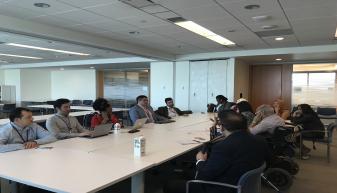
SGPwD meeting on disability constituency coordination in the Asia-Pacific region. The SGPwD held a meeting to discuss how to strengthen the disability constituency in the Asia-Pacific region. The outcome of the meeting was to agree to a draft selection process for subregional focal points and an alternate regional focal point. The process will be further socialised before implementation. Participants also enhanced their understanding of the proposed scope of the regional and subregional focal points, enabling the drafting of a terms of reference to proceed.
Tuesday, July 16th

SGPwD Official Delegation Meeting #2. The SGPwD held a second official delegation meeting on the margins of the HLPF. At the start of the meeting, Jose Viera, Permanent Representative of the SGPwD, and Mohammed Ali Loutfy, Alternate Representative of the SGPwD provided a brief introduction to the Stakeholder Group of Persons with Disabilities and its mandate to engage at the HLPF. The overall objective of the meeting was to propose a method to further strengthen the Stakeholder Group through the development of a 5-year strategic framework which identifies and outlines the goals of the group. The document is still in the initial drafting stage.
Official VNR session: Palau. During the Palau VNR segment, Laisa Vereti of the Pacific Disability Forum delivered a VNR statement on behalf of Palau civil society. The collective statement called on the government to properly support civil society in engagement around the SDGs, including a streamlined approach to funding and consultation. Click here to read the collective statement.
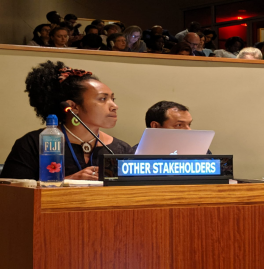
Official VNR session: Kazakhstan. During the Kazakhstan VNR segment, Veniamin Alayev from the New Generation of Human Rights Defenders Coalition Kazakhstan delivered a VNR statement on behalf of Kazakh civil society. Veniamin called on his government to provide social reintegration support for persons with disabilities exiting institutions and introduce a non-discrimination law. Click here to read the collective statement.
Official session: Messages to the HLPF. In the session, “Messages to the HLPF” representatives from various specialized bodies (UNEA, HRC, UNFF14, ILC) delivered messages to the official HLPF segment on recent developments relevant for the implementation of the 2030 Agenda. In attendance were HLPF delegates, including ministers, ambassadors, high-level officials, private sector, civil society and other stakeholders. There was a focus on leave no one behind, the need to include those most marginalized in sustainable development, climate, youth, and public-private partnerships.
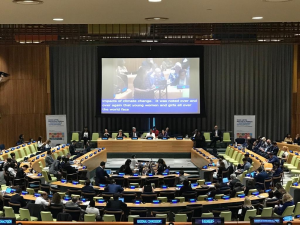
Official session: What are the regions telling us about implementation of the 2030 Agenda and the SDGs? The five regional forums gave an update on the outcomes of the regional forums. For instance, the representative of the Arab region (ESCWA), Mr Noori Al-Dulaimi, Minister of Planning in Iraq, said: “Inclusion is a political development and ethical principle based on accepting differences to curb inequality.” The respondent was a representative from the Women’s Action Forum who proposed that regional forums should also submit entire VNRs before the HLPF to strengthen linkages between local, national, and global levels. Furthermore, the participation must be strengthened and earmarked with financial resources. Uganda made the observation to include a statistical fund, which was a recommendation from their last regional forum to address issues of realigning data with legislation.
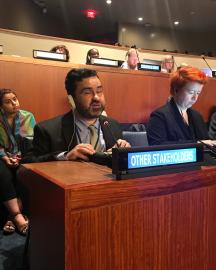
Wednesday, July 17th
Official VNR session: Iraq. During the Iraq VNR segment, Mohammed Loutfy, Alternate Representative of the SGPwD and UN Representative for Disabled Peoples’ International, delivered a VNR statement on behalf of the civil society of Iraq. Mohammed asked the government to clarify how NGOs were included in the VNR consultation process and to elaborate on any other steps taken to broaden and deepen the national dialogue on SDG issues and processes. Click here to read the collective statement.
VNR Lab: Bridging the policy-statistics gap: Strengthening the use of data for evidence-based VNRs. The SGPwD presented in the VNR Lab on “Bridging the policy-statistics gap: Strengthening the use of data for evidence-based VNRs.” UN Statistics Division organized the event with the objective to bring together national statisticians and policy makers from countries that have recently prepared VNRs, along with international partners and other stakeholders to exchange knowledge and share practices on using data for their voluntary national reviews and national SDG monitoring. The discussions focused on specific mechanisms, processes, partnerships and tools that countries have found useful in strengthening the use of data in their VNR reports. The SGPwD highlighted a good practice of community-driven data on the most marginalized groups, including persons with disabilities and the importance of this data to complement national statistical data.

Thursday, July 18th
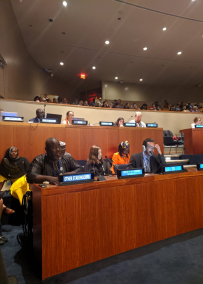
Official VNR session: Mauritius. During the Mauritius VNR segment, Idriss Alzouma Maiga, Chairperson of the African Disability Forum, delivered a VNR statement on behalf of the civil society of Mauritius. Idriss asked the government how it will ensure that data on progress (or lack of progress) are disaggregated by income, gender, age, race, ethnicity, migration status, disability and geographic location, sexual orientation and gender identity, or other features. Click here to read the collective statement.
Official VNR session: Turkmenistan. During the Turkmenistan VNR segment, Neeta Keshary from International Federation of Hard of Hearing People (IFHOH) was ready to deliver a collective statement on behalf of civil society. Unfortunately due to time constraints, she was unable to deliver the statement.
Official session: Lessons learned from the first cycle of HLPF - Messages for 2019 HLPF Summit: What should Heads of State and Government know and how can we improve the HLPF? Juan Angel de Gouveia from RIADIS delivered an official intervention on behalf of the SGPwD in International Sign. Juan Angel called for accessibility and inclusion to ensure the meaningful participation of persons with disabilities in the High-level Political Forum. Click here to watch part of Juan Angel’s statement.
